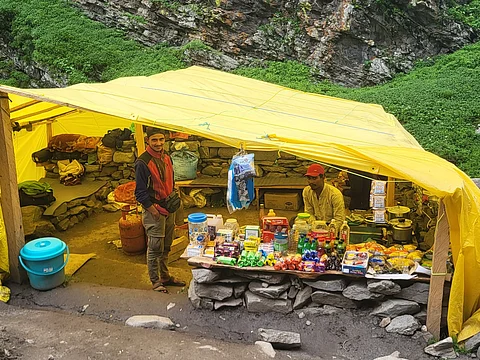

If you’re a hiker on a trail in India, you would be accustomed to seeing packaged food lining the many food stalls at the beginning of a trek, and the inevitable litter that would keep you company on your ascents and descents. Beyond cleanliness drives and awareness campaigns about reducing plastic pollution in the mountains, is there a better way to stop the garbage from accumulating in the first place?
Indiahikes, one of the country’s largest trekking operators, has a solution: Green Dhabas.
The newly launched initiative discourages the proliferation of packaged food on the trail by encouraging vendors to segregate their waste and serve local cuisine in reusable utensils. Started in May 2025, the company collaborates with dhabawalas to protect the mountains and promote the cultural heritage of the region.
So far, eight dhabas in Himachal Pradesh and Uttarakhand have signed up to the project, which is certified into three levels: Level 1 involves handling the waste generated in the dhaba, Level 2 focuses on reducing waste by encouraging vendors to switch to local food, especially for Indiahikes trekkers, while Level 3 is where packaged food is completely phased out and the dhaba provides local food only.
Though the two Himalayan states have rich local cuisines, most trekkers do not know about them, let alone experience them, says Lakshmi Selvakumaran, the head of Indiahikes’ Green Trails department.
“If anyone were asked to name five regional dishes from Uttarakhand or Himachal Pradesh, I am sure most would not know. We wanted to bring back the focus on the local food and bring back the pride in the local food. We hope that this will bring a shift in the demand from trekkers,” she tells Outlook Traveller.
A hiker who is fully onboard with the idea is Jyotsna Mahato, an advocate at the Jharkhand High Court. She started trekking in 2018 and last completed the Sar Pass Trek in the Kullu district of Himachal Pradesh in June 2025.
“I have done several treks, small and big. Two were with Himalayan Hikers on the Hampta Pass Trek and the Sar Pass Trek. During the trek, we were given a bag to wrap around our waist to be responsible for our own litter. This was deposited at one place after the trek was completed,” she says.
“I find the Green Dhabas initiative to be a step ahead to keep nature to its original form. There have been a few times where I opted for the local Himachali food of siddu over Maggi. Personally speaking I literally do not litter around anything; I would rather fill my bags and pockets with wrappers until I find a dustbin, which is highly inspired by how Korean people clean up litter at a football match. A clean environment around keeps a clean mind.”
Integral to the Green Dhabas model is trust between the dhaba owners and Indiahikes. Selvakumaran says that the people they work with are those the team sees regularly on the trail, so it is natural to have open and honest discussions about the thoughts and challenges they face in implementing the initiative.
The company hopes that the success of the Green Dhabas scheme will encourage more dhabawalas to sign up across more locations and that the forest department will lend its support.
“Dhabawalas we have spoken to have been largely supportive. In fact, they outright refuse to serve any packaged food to our trekkers, even when the trekkers ask them for it, stating that Indiahikes works on this. They also share that if more people asked for local food, they would be happy to switch completely to local food,” Selvakumaran says.
“Trekkers love the initiative, too. In fact, in Buran Ghati, the dhabawala also added to the experience by having local dresses for trekkers to wear and take photos. The trekkers loved the raw experience of wearing the local dress and experiencing the local food.”
Reduce bottled water waste by taking your own water bottles with water purifiers.
Carry your own waste through the entire trek and dispose of it only at an appropriate place.
Reduce single-use cutlery by carrying your own dabba/mug/fork/spoon.
Never use wet wipes on the trek, even if they are biodegradable. They do not decompose in the mountains.
Do not stray from the trails to avoid the trampling effect.
Avoid packaged food and instead pack dry fruits and nuts that are available without packaging.
Switch to cloth pads or menstrual cups instead of sanitary pads and tampons. Pack and carry sanitary pads to the nearest city to dispose of them.
